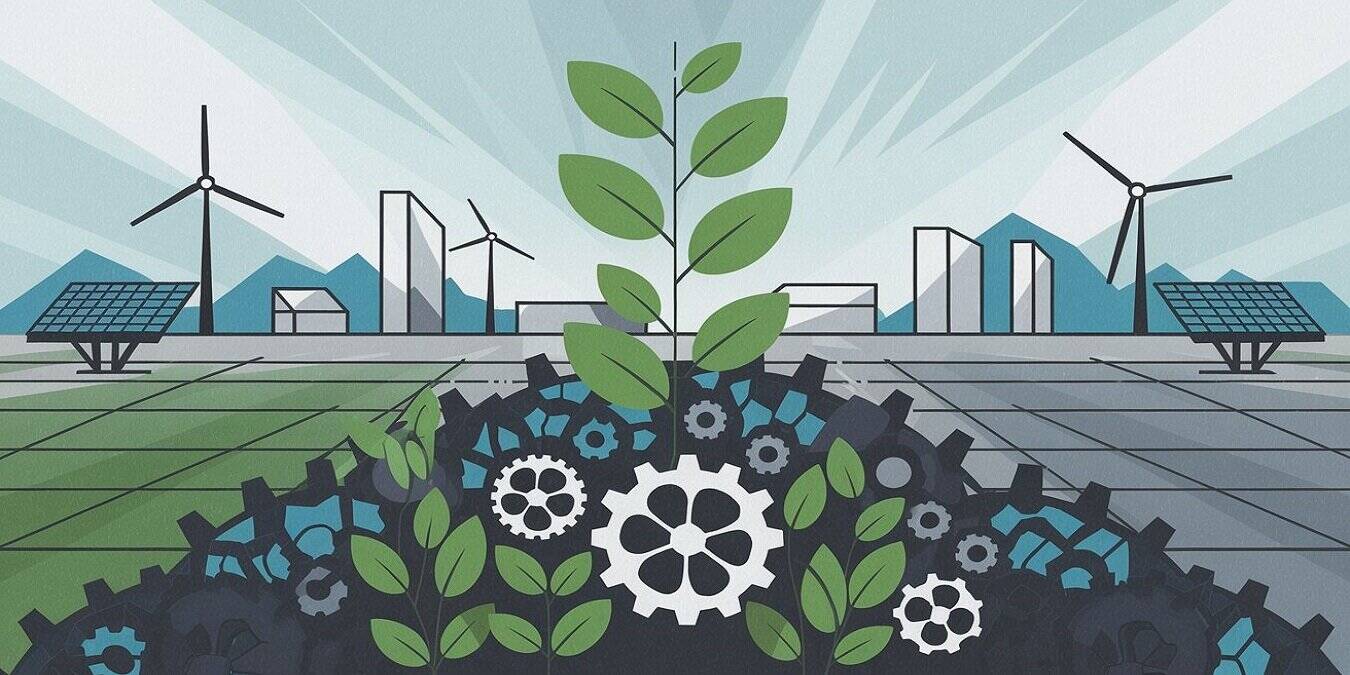
Sustainable Business Practices Shaping Growth in the USA
In recent years, sustainable business practices have shifted from being a buzzword to becoming a core component of many successful companies. Across the USA, businesses are increasingly recognizing that integrating environmental responsibility isn’t just ethical; it’s profitable.
This shift marks a pivotal moment in growth trends in the USA, where economic success and environmental stewardship go hand in hand. But how exactly is sustainability shaping the future of American business?
Whether you’re an entrepreneur, a consumer or simply interested in where industry is headed, understanding this trend is essential. Here, we’ll explore why businesses are embracing sustainable practices, the innovative strategies driving these changes and how sustainability is fueling growth.
Why Sustainable Business Practices Matter More Than Ever
Companies are realizing that sustainable business practices are no longer optional, they’re essential for long-term survival and growth. Sustainability matters to customers and they’re increasingly willing to support brands that share their values. In fact, studies show that a majority of American consumers are more likely to purchase from a company if it shows a genuine commitment to sustainable practices.
Reflection Point: Are you aligning your brand values with those of your customers? What steps can you take to ensure your business practices are aligned with a sustainable future?
The Business Case for Sustainability: Beyond the Environment
- Consumer Demand: The modern consumer is discerning and informed, often preferring brands that actively promote sustainable initiatives.
- Competitive Advantage: Businesses adopting sustainable practices often gain a competitive edge, attracting loyal customers and setting themselves apart.
- Cost Savings: Although sustainability requires an initial investment, companies frequently see long-term cost savings through efficient energy use, reduced waste and streamlined operations.
Question: Have you considered how sustainable practices could streamline operations and save on costs for your business?
These incentives are pushing more American companies to adopt sustainable practices. But what are these trends and how are they shaping the future of business in the USA?
Key Sustainable Business Practices Shaping Growth Trends in the USA
- Renewable Energy Investments
One of the most prominent sustainable business practices today is investing in renewable energy. Solar panels, wind farms and hydroelectric power are becoming increasingly accessible and affordable for businesses. From large corporations to small businesses, shifting toward renewable energy reduces carbon footprints and lowers energy costs in the long run.
- Example: Tech giants like Apple and Google have made significant strides toward becoming 100% renewable. Apple, for example, has been fully powered by renewable energy since 2018 and encourages its suppliers to do the same.
- Trend Insight: According to the Growth Trends in the USA, renewable energy adoption is expected to rise as businesses of all sizes strive to meet emission reduction targets.
- Green Building and Sustainable Architecture
Green buildings, designed with environmental impact in mind, are transforming how companies think about physical spaces. These buildings focus on energy efficiency, reduced water usage and minimal environmental impact. Sustainable architecture also promotes employee well-being, as green buildings often provide better indoor air quality and natural lighting.
- Case Study: The Bullitt Center in Seattle is one of the greenest commercial buildings in the world. This building uses zero net energy, has composting toilets and collects rainwater for potable use.
- Circular Economy Initiatives
The traditional linear economy model – produce, consume, dispose – has led to waste and environmental damage. Many companies are shifting toward a circular economy, which focuses on recycling, reusing and reducing waste.
- Examples of Circular Practices: Some businesses have launched “take-back” programs, allowing customers to return used products for recycling. Others are incorporating recycled materials into their manufacturing processes, creating a closed-loop system.
Quick Tip: Evaluate your business model to see if you can incorporate circular economy principles, such as recycling materials or reusing products.
- Eco-Friendly Product Development
Eco-friendly product development goes beyond simply using sustainable materials. It encompasses the entire product lifecycle, from sourcing and manufacturing to packaging and disposal. Consumers today look for eco-friendly products and brands that are committed to transparency.
- Notable Example: Patagonia, an outdoor apparel brand, prioritizes sustainability by using recycled materials and offering repair services to reduce waste. The company’s commitment to the environment has made it a favorite among eco-conscious consumers.
- Supply Chain Transparency
Supply chains are notoriously complex, but transparency has become crucial for building consumer trust. Companies are increasingly taking steps to track and report their environmental and social impact throughout the supply chain.
- Key Benefits: Transparent supply chains improve accountability, reduce unethical practices and allow companies to monitor and reduce their carbon footprint. This trend aligns closely with the values of a growing demographic that seeks authenticity and accountability.
- Employee Engagement and Corporate Social Responsibility (CSR)
For sustainable business practices to work, they need to start from within the company. Employee engagement in sustainability initiatives not only enhances corporate culture but also fosters innovation. Many businesses are encouraging their employees to contribute to sustainability efforts through volunteer programs, eco-conscious training and CSR initiatives.
- Example: Salesforce has a strong commitment to CSR, encouraging employees to volunteer and participate in community initiatives focused on sustainability.
Reflection: How can your business engage employees to contribute to a sustainable future?
The Impact of Sustainable Business Practices on the American Economy
The shift toward sustainable business practices has significant economic implications. This movement isn’t just about environmental protection; it’s about economic growth, job creation and innovation.
- Job Creation in Renewable Energy and Green Sectors
Sustainability has catalyzed growth in industries like renewable energy, recycling and eco-friendly product manufacturing. The renewable energy sector alone has created thousands of jobs in solar and wind power and these numbers continue to grow.
- Increased Competitiveness on a Global Scale
By adopting sustainable practices, American companies can stay competitive globally. With sustainability standards increasingly becoming a factor in global trade agreements, businesses that prioritize sustainability may have better access to international markets.
- Incentives and Government Support
Governments in the USA are offering incentives to businesses that adopt sustainable practices, such as tax breaks, grants and subsidies for renewable energy investments. These incentives reduce the financial burden of adopting sustainability initiatives, making it easier for businesses to transition.
How Small Businesses Are Embracing Sustainable Practices
Sustainable practices aren’t just for large corporations. Small businesses across the USA are playing a crucial role in this movement, demonstrating that sustainability can be accessible and scalable.
- Local Sourcing and Eco-Friendly Packaging
Many small businesses are reducing their environmental footprint by sourcing materials locally and using eco-friendly packaging. This reduces transportation emissions and resonates well with local customers who want to support sustainable initiatives.
- Community-Based Recycling and Reuse Programs
Some small businesses are establishing community-based recycling programs, encouraging customers to recycle packaging or products in-store. These initiatives help build a loyal customer base and promote environmental responsibility.
- Digital Solutions and Paperless Operations
Going paperless, using digital marketing over print and adopting remote work options are simple yet effective ways for small businesses to reduce waste. These sustainable business practices are not only cost-effective but also demonstrate a commitment to sustainability.
Looking Ahead: The Future of Sustainable Business Practices in the USA
The rise of sustainable business practices is only expected to accelerate. As younger generations prioritize environmental responsibility, businesses that fail to adapt risk falling behind.
- Technological Advancements Supporting Sustainability
From artificial intelligence to blockchain, technology is making it easier for businesses to adopt sustainable practices. AI can optimize energy use, while blockchain provides transparency in supply chains. These advancements will drive further growth trends in the USA and enable companies to monitor and reduce their environmental impact.
- Increased Regulations and Industry Standards
Governments are likely to impose stricter regulations in the coming years, making sustainable practices mandatory rather than optional. Companies will need to meet new industry standards to remain competitive, further embedding sustainability into business practices.
- Consumer Education and Increased Accountability
As consumers become more informed about sustainability, they’ll hold businesses accountable for their actions. This will push companies to adopt transparent practices and prioritize sustainability.
Question: Are you prepared for the sustainability expectations of future customers?
Practical Tips for Implementing Sustainable Business Practices
If you’re ready to embrace sustainability in your business, here are some practical steps to get started:
- Start Small: Don’t feel pressured to overhaul your entire operation. Begin with small, impactful changes such as energy-efficient lighting or paperless billing.
- Evaluate Your Supply Chain: Work with suppliers that share your commitment to sustainability. Ensure that materials and products align with your values.
- Set Measurable Goals: Track your progress by setting measurable sustainability goals, such as reducing energy consumption by a specific percentage over a set period.
- Engage Your Team: Foster a company culture that values sustainability by involving your employees in green initiatives and educating them on sustainable practices.
- Communicate Your Efforts: Transparency is key. Share your sustainability efforts with your customers to build trust and inspire others to support your mission.
Conclusion: The Power of Sustainable Business Practices in Shaping the Future
As we look to the future, it’s clear that sustainable business practices are more than a trend, they’re a necessity for enduring success. In the USA, growth trends indicate that sustainability is driving innovation, economic progress and lasting customer loyalty.
By embracing sustainable practices, businesses can reduce costs, attract loyal customers and stay ahead in an increasingly eco-conscious world.
Whether you’re a small business owner or part of a larger organization, the time to act is now. Sustainable business practices are your path to aligning with today’s consumers and securing a future for your brand in a changing world.
By incorporating sustainability into your business model, you’re not only contributing to a healthier planet, you’re setting the stage for growth and resilience in the years to come.















Its fantastic as your other posts : D, regards for posting. “So, rather than appear foolish afterward, I renounce seeming clever now.” by William of Baskerville.
Woah! I’m really digging the template/theme of this blog. It’s simple, yet effective. A lot of times it’s very hard to get that “perfect balance” between usability and visual appearance. I must say you have done a fantastic job with this. In addition, the blog loads very fast for me on Firefox. Exceptional Blog!
Pretty nice post. I just stumbled upon your blog and wanted to say that I’ve truly enjoyed browsing your blog posts. In any case I will be subscribing to your rss feed and I hope you write again very soon!
You are a very smart person!
Very interesting info !Perfect just what I was searching for! “If you could choose one characteristic that would get you through life, choose a sense of humor.” by Jennifer Jones.
I absolutely love your blog and find most of your post’s to be what precisely I’m looking for.
I conceive this website contains some rattling excellent info for everyone. “It is easy enough to define what the Commonwealth is not. Indeed this is quite a popular pastime.” by Elizabeth II.
Best written content material, regards for information .
Useful info. Fortunate me I discovered your website by accident, and I am shocked why this twist of fate didn’t happened earlier! I bookmarked it.
Hello very cool web site!! Guy .. Beautiful .. Superb .. I’ll bookmark your web site and take the feeds also…I’m satisfied to seek out a lot of helpful info here in the submit, we’d like work out extra techniques in this regard, thank you for sharing.
I love it when people come together and share opinions, great blog, keep it up.
It is truly a nice and helpful piece of information. I’m satisfied that you simply shared this useful information with us. Please stay us up to date like this. Thank you for sharing.
I have been checking out a few of your posts and I can state pretty good stuff. I will make sure to bookmark your website.